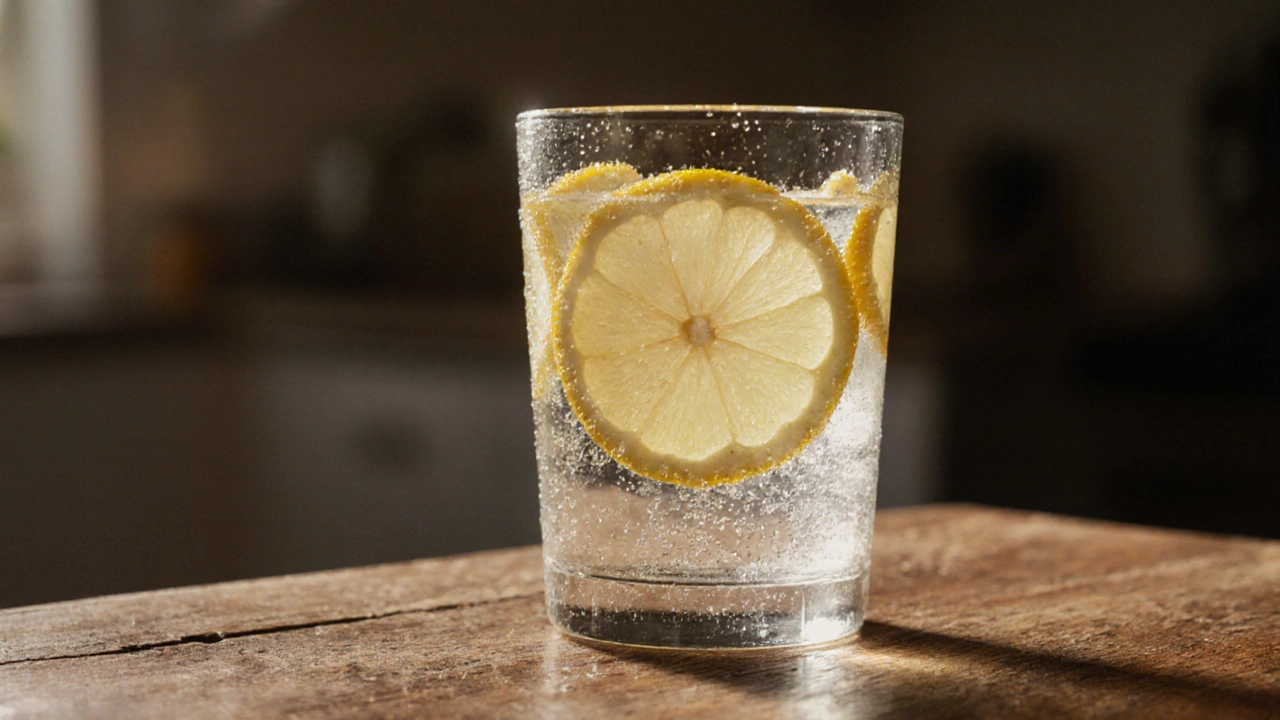
Lemon Water Plan Generator
Create Your Personalized Plan
Answer a few quick questions to get your customized lemon water routine.
Ever wondered if a simple glass of lemon water can really change how you feel after a week? You’re not alone. People swear by the drink for everything from clearer skin to a faster metabolism, but what does the science actually say? Below, we break down what happens inside your body day by day, flag the myths that need busting, and hand you a practical 7‑day schedule you can start tomorrow.
What Is Lemon Water?
Lemon water is a mixture of freshly squeezed lemon juice and plain water, usually served at room temperature or slightly warm. The drink provides a modest dose of vitamin C, a handful of antioxidants, and a splash of citric acid that can affect the body’s pH balance.
Why People Call It a “Detox” Drink
Detox isn’t a medical term - it’s a marketing shortcut for anything that claims to help the body eliminate waste faster. Lemon water fits the bill because it encourages higher fluid intake, supplies a bit of vitamin C (which supports the immune system), and may improve liver enzyme activity in some studies.
Day‑by‑Day Effects: The First Week Explained
Here’s a realistic timeline of what most people notice when they stick to a 7‑day lemon water habit.
Days 1-2: Hydration Boost
Hydration is the first, most obvious win. Adding flavor makes water more appealing, so many users end up drinking 1½-2L per day instead of 800mL. Better hydration supports kidney function, helps regulate body temperature, and reduces the feeling of sluggishness.
Days 3-4: Digestion Gets a Kick
Digestion may improve thanks to two factors. First, the warm version of the drink can stimulate gastric motility, nudging the stomach to empty more efficiently. Second, citric acid can boost the production of stomach acid, which helps break down food and absorb nutrients like iron.
Days 5-6: Skin, Antioxidants, and Energy
Vitamin C is a potent Antioxidant. After a few days of consistent intake, you may notice a subtle glow-mainly because antioxidants combat free radicals that contribute to dull skin. Some users also report a mild energy lift, likely from the combination of better hydration and a small caffeine‑like zing from the citrus aroma.
Day 7: Overall Assessment and Possible Pitfalls
By the end of the week, the most common outcomes are:
- Improved urine color (paler means you’re drinking enough).
- Reduced bloating for a minority of people, especially those who previously ate a lot of salty snacks.
- Potential tooth‑enamel erosion if you sip constantly throughout the day without rinsing.
Remember, the changes are subtle. Lemon water is not a miracle cure, but it can be a helpful habit starter.
Backed‑by‑Research Benefits
Studies on citrus water are limited, yet a few peer‑reviewed papers give us clues.
- Hydration and kidney stones: A 2019 trial found that drinking lemon‐flavored water increased urinary citrate, a known inhibitor of calcium oxalate stone formation.
- Vitamin C absorption: Research shows that a 30mL squeeze of lemon (about half a lemon) supplies roughly 15mg of vitamin C - enough to boost plasma levels by 10% after a single dose.
- Weight management: A small pilot study with 24 adults reported a 1.2kg average weight loss after two weeks of replacing sugary drinks with lemon water, attributed mainly to lower calorie intake.
While none of these outcomes are dramatic on their own, they add up when combined with a balanced diet and regular movement.

Common Myths & Risks
Below are the headlines you’ll see on social media, and the reality behind each.
| Drink | Vitamin C (mg) | Calories per 250ml | Typical pH | Key Benefit |
|---|---|---|---|---|
| Lemon water | 15 | 5 | 2.5-3.0 (acidic) | Hydration + Vitamin C |
| Cucumber water | 0 | 5 | 6.5-7.0 (neutral) | Mild diuretic effect |
| Apple cider vinegar drink | 0 | 10 | 2.0-3.0 (very acidic) | Potential blood‑sugar regulation |
The table shows why lemon water isn’t the only “detox” option - each drink has its own strengths and drawbacks. Choose based on what you need most.
How to Prepare the Optimal Glass
- Use fresh, organic lemons whenever possible. Pre‑squeezed juice often contains preservatives that offset the benefits.
- Warm the water to about 40°C (just above room temperature). Hot water can degrade vitamin C, while ice‑cold water may feel harsh on the stomach.
- Mix the juice of half a lemon (≈15ml) with 250ml of water. Adjust the ratio if the flavor is too sharp - you want it pleasant enough to drink daily.
- Add a pinch of sea salt or a dash of raw honey if you need extra electrolytes, especially after intense workouts.
- Drink within 10‑15 minutes of preparation. The longer it sits, the more vitamin C degrades.
Pro tip: Rinse your mouth with plain water after each glass to protect enamel.
7‑Day Sample Plan
Follow this schedule to see the most noticeable changes without overdoing it.
| Day | Morning (upon waking) | Mid‑day | Evening (after dinner) |
|---|---|---|---|
| 1‑7 | 250ml warm lemon water | Optional second glass if you feel thirsty | 250ml room‑temp lemon water (no added sugar) |
Stick to the same amount each day. If you’re an athlete or work in a hot climate, add a second glass in the afternoon.

Checklist: Avoiding the Hidden Downsides
- Don’t sip continuously for >4hours - give your teeth a break.
- Limit to 1‑2 glasses per day; more can cause stomach upset due to excess acidity.
- Watch for signs of heartburn. If you have GERD, consult a doctor before starting.
- If you’re on medication that interacts with high vitaminC (e.g., certain chemotherapy drugs), seek professional advice.
- Store lemon juice in the fridge and use within 24hours to prevent bacterial growth.
When to Stop or Adjust the Habit
If after a week you notice any of the following, consider cutting back:
- Persistent dental sensitivity - it’s a sign of enamel wear.
- Excessive stomach cramps or diarrhea - your gut may be reacting to extra acid.
- Increased thirst despite drinking enough water - could indicate electrolyte imbalance.
In those cases, drop to one glass a day or switch to plain filtered water for a few days before resuming.
Frequently Asked Questions
Can lemon water replace my regular water intake?
No. Lemon water is still just water with a flavor boost. Aim for the same total volume of fluids you would normally drink each day.
Does the citric acid in lemon water help alkalize the body?
Surprisingly, yes. Even though the drink is acidic, metabolism of citric acid produces alkaline by‑products that can mildly raise blood pH, a concept often referred to as the "alkaline diet" effect.
Is it safe to drink lemon water on an empty stomach?
For most healthy adults, a small glass first thing in the morning is fine and may even jump‑start digestion. People with acid reflux should test a smaller amount or wait 30 minutes after waking.
How long does it take to see skin benefits?
Skin changes are gradual. Most users report a modest glow after 2‑3weeks of consistent hydration and vitaminC intake.
Can I add other ingredients to my lemon water?
Sure. A pinch of cayenne, fresh ginger slices, or a teaspoon of raw honey are popular additions that don’t dilute the core benefits.


11 Comments
Wow, this article really tries to dazzle us with lemon hype, but the facts are as flat as a squeezed lemon! The writer says "boosts metabolism" – that's a vague claim that needs solid data, not just buzzwords. Also, the phrase "citric acid can affect the body’s pH balance" should have an apostrophe after body, not before. I love the idea of a simple drink, but calling it a "detox" is pure marketing fluff! If you want real health benefits, pair lemon water with proper diet and exercise. In short, don’t be fooled by shiny headlines.
Sounds like a chill experiment, might give it a try.
The human body is a complex system, and any claim about a single ingredient must be examined within that larger context. While lemon water can add a modest amount of vitamin C, it is not a miracle cure, as the article rightly notes. One could argue that the ritual of drinking something warm each morning serves as a mindful pause, aligning with centuries‑old practices of conscious hydration. However, let us not overstate the metabolic impact; a balanced diet remains the cornerstone of health. In essence, the habit is harmless, but its benefits are modest and should be presented without hyperbole.
First, the article repeatedly uses "its" where "it's" is required – a basic error that undermines credibility. Second, the supposed "alkaline effect" is overstated; the science is far from conclusive. Finally, the claim about weight loss is based on a tiny pilot study and should be labeled as anecdotal at best.
I can see why many people enjoy a glass of lemon water in the morning – it’s a gentle way to stay hydrated and add a bit of flavor without calories. If you’re concerned about enamel, just rinse your mouth with plain water afterward, as the article suggests. Keep it simple and listen to how your body feels.
Honestly, the whole "lemon water miracle" is a gimmick pushed by health influencers, not by our respectable British traditions of plain water and tea. Moreover, the article’s grammar is riddled with errors – "its" versus "it's" appears countless times. If you want true hydration, stick to good old boiled water; leave the citrus hype to the markets.
Allow me to elevate this discourse: the notion that a humble citrus infusion could rival the sophistication of a well‑crafted espresso is, frankly, theatrical. One must consider the provenance of the lemons, the mineral content of the water, and the precise temperature, lest we descend into culinary mediocrity. The article skirts these details, offering only a generic recipe, which feels almost negligent for discerning palates. In the realm of gastronomic refinement, such oversimplification warrants a standing ovation for audacity, if not for accuracy.
While I appreciate the evocative language employed herein, I must respectfully point out that the assertions regarding metabolic enhancement lack rigorous peer‑reviewed evidence. A measured, scholarly approach would benefit the readership.
There’s more to this "lemon water" craze than meets the eye – big beverage corporations have been quietly funding wellness blogs to steer consumers away from sugary drinks that profit them. Notice how the article conveniently omits any mention of the dairy industry’s hidden stake in alternative beverages. Also, the frequent misuse of "its" instead of "it's" suggests a rushed, perhaps deliberately sloppy, production meant to distract from the underlying agenda. Stay vigilant.
First, let’s acknowledge that lemon water, when consumed responsibly, can indeed contribute to daily hydration and provide a modest boost of vitamin C. The citric acid may aid gastric motility, but the effect is subtle and varies from person to person. It is important to understand that the body’s pH balance is tightly regulated; the so‑called “alkaline” effect of lemon water is indirect and not a primary driver of health. When evaluating the claim about kidney stones, the cited 2019 trial demonstrated an increase in urinary citrate, yet the sample size was limited, so further research is warranted. Regarding weight management, replacing sugary beverages with lemon water reduces caloric intake, which is a well‑established strategy for modest weight loss. However, the article’s assertion of a 1.2 kg loss over two weeks should be contextualized as a result of overall diet changes, not solely the lemon water itself. For skin health, vitamin C supports collagen synthesis, but visible improvements typically require weeks of consistent intake and may be influenced by other factors such as sleep and sunscreen use. Dental health is a genuine concern; the acid can erode enamel if exposure is prolonged, so rinsing with water afterward is a prudent practice. Individuals with gastroesophageal reflux disease should monitor their tolerance, as the acidity might exacerbate symptoms. From a practical standpoint, preparing the drink with fresh lemons maximizes bioactive compounds, whereas pre‑packaged juice often contains preservatives that diminish benefits. The recommended temperature of around 40 °C strikes a balance between preserving vitamin C and ensuring comfort for the stomach. Adding a pinch of sea salt can replenish electrolytes after intense exercise, but it is optional for most people. It is also worth noting that lemon water should complement, not replace, a varied diet rich in fruits, vegetables, whole grains, and lean proteins. Consistency is key: the modest benefits accumulate over time rather than manifest dramatically after a single week. Finally, listen to your body; if you experience any adverse symptoms such as increased heartburn or dental sensitivity, adjust the frequency or discontinue the habit. In summary, lemon water is a low‑risk, potentially beneficial addition to a healthy lifestyle, provided it is consumed mindfully.
Oh sure, because drinking a glass of sour water magically transforms you into a superhuman – that’s exactly what our glorious nation needs. By the way, the article’s "its" vs "it's" mishaps are as abundant as the unfounded claims.